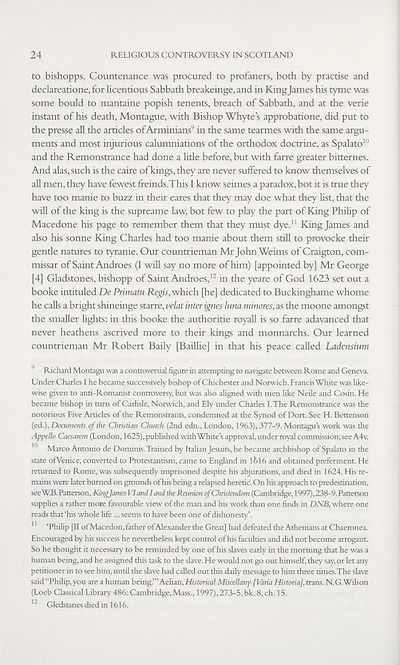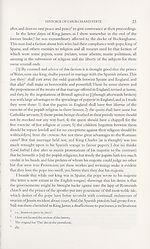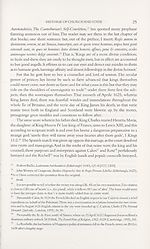Series 5 > Religious Controversy in Scotland 1625-1639
(39) Page 24
Download files
Complete book:
Individual page:
Thumbnail gallery: Grid view | List view

24
RELIGIOUS CONTROVERSY IN SCOTLAND
to bishopps. Countenance was procured to profaners, both by practise and
declareatione, for licentious Sabbath breakeinge, and in King James his tyme was
some bould to mantaine popish tenents, breach of Sabbath, and at the verie
instant of his death, Montague, with Bishop Whyte’s approbatione, did put to
the presse all the articles of Arminians9 in the same tearmes with the same argu¬
ments and most injurious calumniations of the orthodox doctrine, as Spalato10
and the Remonstrance had done a litle before, but with farre greater bitternes.
And alas, such is the caire of kings, they are never suffered to know themselves of
all men, they have fewest ffeinds.This I know seimes a paradox, bot it is true they
have too manie to buzz in their eares that they may doe what they list, that the
will of the king is the supreame law, bot few to play the part of King Philip of
Macedone his page to remember them that they must dye.11 King James and
also his sonne King Charles had too manie about them still to provocke their
gende natures to tyranie. Our countrieman Mr John Weims of Craigton, com¬
missar of Saint Androes (I will say no more of him) [appointed by] Mr George
[4] Gladstones, bishopp of Saint Androes,12 in the yeare of God 1623 set out a
booke intituled De Primatu Real's, which [he] dedicated to Buckinghame whome
he calls a bright shineinge starre, velat inter ignes luna minores, as the moone amongst
the smaller lights: in this booke the authoritie royall is so farre adavanced that
never heathens ascrived more to their kings and monnarchs. Our learned
countrieman Mr Robert Baily [Baillie] in that his peace called Ladensium
Richard Montagu was a controversial figure in attempting to navigate between Rome and Geneva.
Under Charles I he became successively bishop of Chichester and Norwich. Francis White was like¬
wise given to anti-Romanist controversy, but was also aligned with men like Neile and Cosin. He
became bishop in turn of Carlisle, Norwich, and Ely under Charles I. The Remonstrance was the
notorious Five Articles of the Remonstrants, condemned at the Synod of Dort. See H. Bettenson
(ed.). Documents of the Christian Church (2nd edn., London, 1963), 377-9. Montagus work was the
Appello Caesarem (London, 1625), published with White s approval, under royal commission; see A4v.
10 Marco Antonio de Dominis.Trained by Italian Jesuits, he became archbishop of Spalato in the
state ofVenice, converted to Protestantism, came to England in 1&16 and obtained preferment. He
returned to Rome, was subsequendy imprisoned despite his abjurations, and died in 1624. His re¬
mains were later burned on grounds of his being a relapsed heretic. On his approach to predestination,
seeWB. Patterson, Kingjames VI and I and the Reunion of Christendom (Cambridge, 1997),238-9. Patterson
supplies a rather mote favourable view of the man and his work than one finds in DNB, where one
reads that‘his whole fife ...seems to have been one of dishonesty’.
11 ‘Philip [II ofMacedon, father ofAlexander the Great] had defeated the Athenians at Chaeronea.
Encouraged by his success he nevertheless kept control of his faculties and did not become arrogant.
So he thought it necessary to be reminded by one of his slaves early in the morning that he was a
human being, and he assigned this task to the slave. He would not go out himself, they say, or let any
petitioner in to see him, until the slave had called out this daily message to him three times.The slave
said “Phihp, you are a human being.”’Aelian, Historical Miscellany [Varia Historia], trans. N.G. Wilson
(Loeb Classical Library 486: Cambridge, Mass., 1997), 273-5, bk. 8, ch. 15.
12 Gledstanes died in i 616.
RELIGIOUS CONTROVERSY IN SCOTLAND
to bishopps. Countenance was procured to profaners, both by practise and
declareatione, for licentious Sabbath breakeinge, and in King James his tyme was
some bould to mantaine popish tenents, breach of Sabbath, and at the verie
instant of his death, Montague, with Bishop Whyte’s approbatione, did put to
the presse all the articles of Arminians9 in the same tearmes with the same argu¬
ments and most injurious calumniations of the orthodox doctrine, as Spalato10
and the Remonstrance had done a litle before, but with farre greater bitternes.
And alas, such is the caire of kings, they are never suffered to know themselves of
all men, they have fewest ffeinds.This I know seimes a paradox, bot it is true they
have too manie to buzz in their eares that they may doe what they list, that the
will of the king is the supreame law, bot few to play the part of King Philip of
Macedone his page to remember them that they must dye.11 King James and
also his sonne King Charles had too manie about them still to provocke their
gende natures to tyranie. Our countrieman Mr John Weims of Craigton, com¬
missar of Saint Androes (I will say no more of him) [appointed by] Mr George
[4] Gladstones, bishopp of Saint Androes,12 in the yeare of God 1623 set out a
booke intituled De Primatu Real's, which [he] dedicated to Buckinghame whome
he calls a bright shineinge starre, velat inter ignes luna minores, as the moone amongst
the smaller lights: in this booke the authoritie royall is so farre adavanced that
never heathens ascrived more to their kings and monnarchs. Our learned
countrieman Mr Robert Baily [Baillie] in that his peace called Ladensium
Richard Montagu was a controversial figure in attempting to navigate between Rome and Geneva.
Under Charles I he became successively bishop of Chichester and Norwich. Francis White was like¬
wise given to anti-Romanist controversy, but was also aligned with men like Neile and Cosin. He
became bishop in turn of Carlisle, Norwich, and Ely under Charles I. The Remonstrance was the
notorious Five Articles of the Remonstrants, condemned at the Synod of Dort. See H. Bettenson
(ed.). Documents of the Christian Church (2nd edn., London, 1963), 377-9. Montagus work was the
Appello Caesarem (London, 1625), published with White s approval, under royal commission; see A4v.
10 Marco Antonio de Dominis.Trained by Italian Jesuits, he became archbishop of Spalato in the
state ofVenice, converted to Protestantism, came to England in 1&16 and obtained preferment. He
returned to Rome, was subsequendy imprisoned despite his abjurations, and died in 1624. His re¬
mains were later burned on grounds of his being a relapsed heretic. On his approach to predestination,
seeWB. Patterson, Kingjames VI and I and the Reunion of Christendom (Cambridge, 1997),238-9. Patterson
supplies a rather mote favourable view of the man and his work than one finds in DNB, where one
reads that‘his whole fife ...seems to have been one of dishonesty’.
11 ‘Philip [II ofMacedon, father ofAlexander the Great] had defeated the Athenians at Chaeronea.
Encouraged by his success he nevertheless kept control of his faculties and did not become arrogant.
So he thought it necessary to be reminded by one of his slaves early in the morning that he was a
human being, and he assigned this task to the slave. He would not go out himself, they say, or let any
petitioner in to see him, until the slave had called out this daily message to him three times.The slave
said “Phihp, you are a human being.”’Aelian, Historical Miscellany [Varia Historia], trans. N.G. Wilson
(Loeb Classical Library 486: Cambridge, Mass., 1997), 273-5, bk. 8, ch. 15.
12 Gledstanes died in i 616.
Set display mode to:
![]() Universal Viewer |
Universal Viewer | ![]() Mirador |
Large image | Transcription
Mirador |
Large image | Transcription
Images and transcriptions on this page, including medium image downloads, may be used under the Creative Commons Attribution 4.0 International Licence unless otherwise stated. ![]()
| Scottish History Society volumes > Series 5 > Religious Controversy in Scotland 1625-1639 > (39) Page 24 |
|---|
| Permanent URL | https://digital.nls.uk/127328433 |
|---|
| Description | Over 180 volumes, published by the Scottish History Society, containing original sources on Scotland's history and people. With a wide range of subjects, the books collectively cover all periods from the 12th to 20th centuries, and reflect changing trends in Scottish history. Sources are accompanied by scholarly interpretation, references and bibliographies. Volumes are usually published annually, and more digitised volumes will be added as they become available. |
|---|


